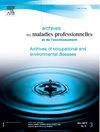Syndrome du QT long congénital et aptitude professionnelle : mise au point pour le médecin du travail
IF 0.3
4区 医学
Q4 PUBLIC, ENVIRONMENTAL & OCCUPATIONAL HEALTH
Archives Des Maladies Professionnelles Et De L Environnement
Pub Date : 2025-07-07
DOI:10.1016/j.admp.2025.102914
引用次数: 0
Abstract
Le syndrome du QT long congénital (SQTL) est une maladie génétique caractérisée par l’allongement de l’intervalle QT qui peut se compliquer d’arythmies ventriculaires potentiellement mortelles. Les progrès de la génétique ont permis une bonne compréhension des mécanismes physiopathologiques et une prise en charge thérapeutique optimisée. La question de l’aptitude médicale des salariés atteints d’un SQTL est un sujet quasiment ignoré de la littérature médicale. Cet article propose une approche structurée afin d’aider le médecin du travail dans cette démarche, elle intègre l’évaluation du risque individuel essentiellement par l’anamnèse et l’utilisation d’un modèle quantitatif 1-2-3 LQTS en combinaison avec l’évaluation des facteurs déclenchants les arythmies ventriculaires malignes.
Congenital long QT syndrome (LQTS) is a genetic disease characterized by the prolongation of the QT interval, which can lead to potentially fatal ventricular arrhythmias. Advances in genetics have allowed for a good understanding of the pathophysiological mechanisms and optimized therapeutic management. The question of medical fitness for employment of workers with LQTS is a subject virtually ignored in the medical literature. This article proposes an approach to assist the occupational physician in this process, integrating the assessment of individual risk mainly through medical history and the use of a quantitative 1-2-3 LQTS model with the evaluation of triggering factors for malignant ventricular arrhythmias.
先天性长QT综合征与职业能力:职业医生的发展
先天性长QT综合征(SQTL)是一种以QT间隔延长为特征的遗传疾病,可伴有危及生命的心律失常。遗传学的进步使人们对生理病理机制有了很好的理解,并优化了治疗管理。在医学文献中,患有SQTL的员工的医疗能力问题几乎被忽视了。本文提出了一种结构化的方法来帮助职业医生在这一过程中,它集成了个人风险评估,主要是通过病史和使用定量模型1-2-3 LQTS结合评估触发恶性心律失常的因素。先天性长QT综合征(LQTS)是一种以延长QT间隔为特征的遗传疾病,可导致潜在致命的心律失常。遗传学的进步使人们能够很好地理解病理生理机制和优化治疗管理。在医学文献中,LQTS工人就业的医疗适宜性问题几乎被忽视。本文提出了一种方法来协助职业医生在这一过程中,将个人风险的评估主要通过病史和使用定量1-2-3 LQTS模型与恶性心律失常的触发因素的评估结合起来。
本文章由计算机程序翻译,如有差异,请以英文原文为准。
求助全文
约1分钟内获得全文
求助全文
来源期刊

Archives Des Maladies Professionnelles Et De L Environnement
医学-公共卫生、环境卫生与职业卫生
CiteScore
0.40
自引率
50.00%
发文量
185
审稿时长
50 days
期刊介绍:
The Archives of Occupational and Environmental Diseases (Archives des maladies professionnelles et de l''environnement) publish scientific original articles in the form of memoirs, developments and general health reviews. The journal is a reliable source of information, which lets you gain additional knowledge or update your knowledge of basic or original issues.
The section Continuous professional development focuses on a major issue and gives you the tools to optimize your practice. The content is divided in 3 parts: Reading Test, Answer to the Reading Test and Scientific Press Review, which let you share the analysis, by the editorial board, of articles from major English-language journals.
The section Legal Environment discusses an environmental culture. The section Letter to the editor keeps you informed about the press review; the Legislation, with the latest regulations published in the Official Journal; and the agenda of the meetings and the Congress, the questions–answers, etc. The Archives of Occupational and Environmental Diseases include all the scientific communications of the French occupational health societies, of which they are the official journal.
 求助内容:
求助内容: 应助结果提醒方式:
应助结果提醒方式:


